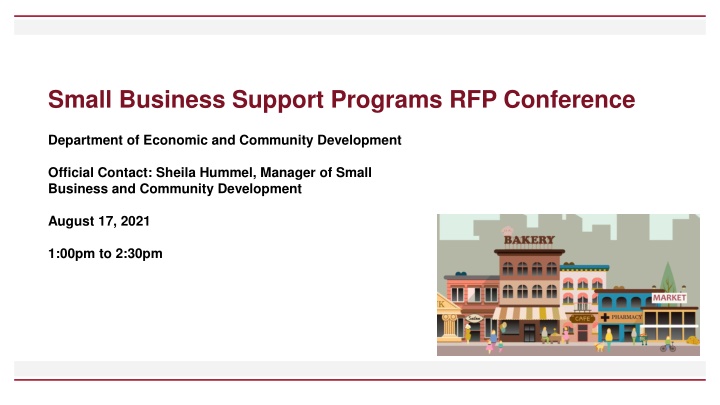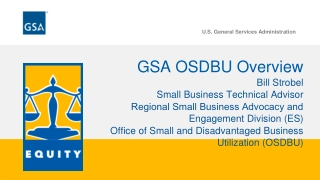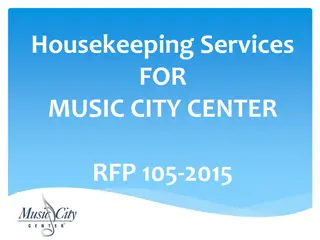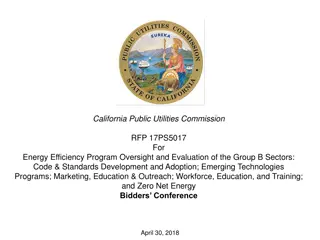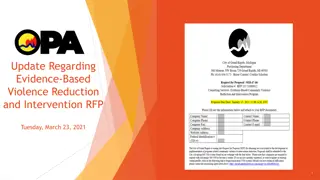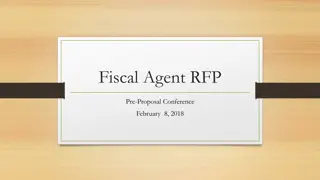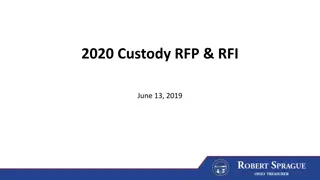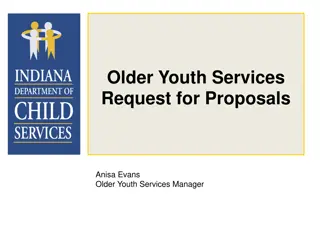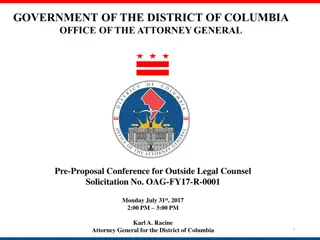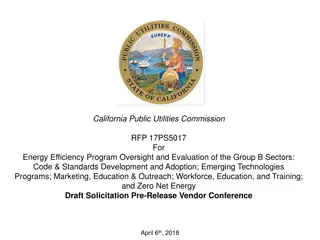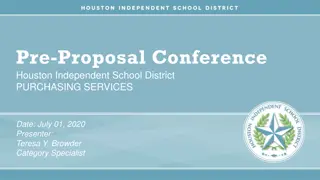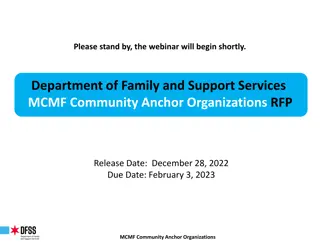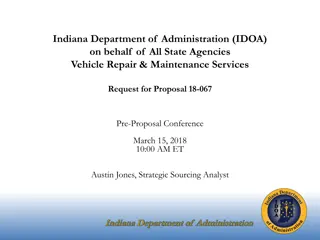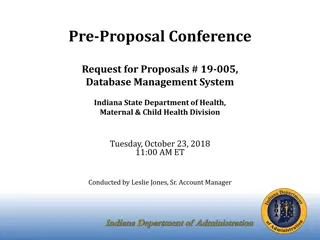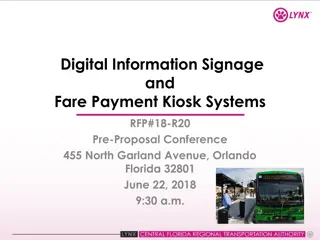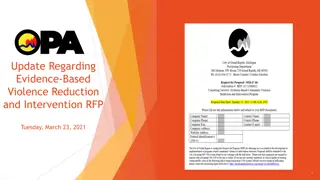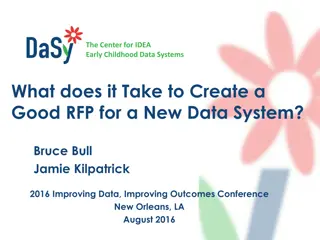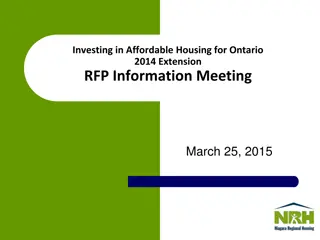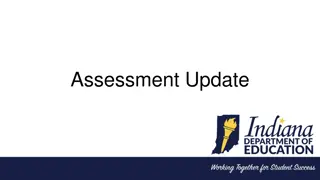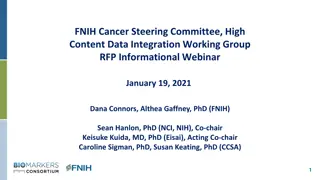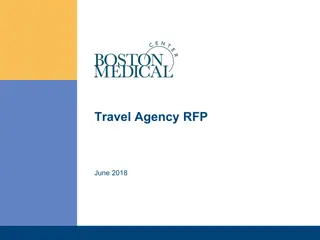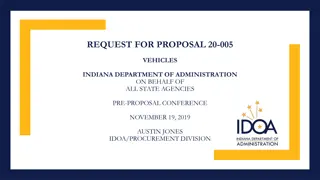Small Business Support Programs RFP Conference Details
Small Business Support Programs RFP Conference conducted by the Department of Economic and Community Development focuses on aiding businesses in Connecticut through financial assistance over the next five years. Proposals are sought to administer programs for small and minority-owned businesses, aiming at self-sustainability by 2026.
Download Presentation

Please find below an Image/Link to download the presentation.
The content on the website is provided AS IS for your information and personal use only. It may not be sold, licensed, or shared on other websites without obtaining consent from the author.If you encounter any issues during the download, it is possible that the publisher has removed the file from their server.
You are allowed to download the files provided on this website for personal or commercial use, subject to the condition that they are used lawfully. All files are the property of their respective owners.
The content on the website is provided AS IS for your information and personal use only. It may not be sold, licensed, or shared on other websites without obtaining consent from the author.
E N D
Presentation Transcript
Small Business Support Programs RFP Conference Department of Economic and Community Development Official Contact: Sheila Hummel, Manager of Small Business and Community Development August 17, 2021 1:00pm to 2:30pm
Informational Conference Agenda Housekeeping Items Opening Remarks by Deputy Commissioner Thames RFP Overview Key Dates and Next Steps Q&A
RFP Housekeeping items Please type your questions into the chat. The team will answer as many as possible in our allotted Q&A time at the end of the presentation. Questions and Answers will be posted in writing on the Department of Economic and Community Development https://portal.ct.gov/DECD on Dept of Administrative Services https://portal.ct.gov/DAS/CTSource/BidBoard Answers posted in writing will supersede answers given live, if there is a conflict. Additional questions may be submitted through Friday, August 27 by emailing DECDSmallBusinessSupportRFP@ct.gov. 3
Welcome and Introductions Welcome to the RFP conference for RFP #21ECD8092021: Small Business Support Programs, hosted by the Department of Economic and Community Development! Please introduce yourself in the chat with your name and the organization you are representing (Optional) Feel free to provide some contact information for other attendees that may wish to approach your organization about potential partnerships 4
Program Context and Goals The Department of Economic and Community Development is soliciting proposals from organizations to administer programs that will aid the growth of new and existing small businesses during the next five years. Public Act No. 21-2, Sec. 283 restructured the Small Business Express program, shifting the state away from providing direct incentives to businesses, DECD will now partner with organizations on programs designed to spur private investment, maximize private-sector expertise, and share credit risk. The primary goals of this RFP process are: 1. To provide financial and technical support to Connecticut-based businesses. 2. To distribute a total of $125 million in financial assistance over five years. 3. To ensure at least 50% of the financial assistance will go to small and minority-owned businesses. 4. To ensure that programs are self-sustaining, without requiring further financial support from the state, after July 1, 2026. 6
Key Scope Elements: Support for Businesses Elements of Scope Details and Justification Understanding that not all everyone is savvy when it comes to marketing, management, finances, or strategic planning, proposals should contain a strong technical assistance component to help business navigate the application and planning processes. Provide technical assistance Small business financial demands can seem endless. DECD wants to help entrepreneurs and owners find the funding solution right for their business. Selected providers can include different financing options to support the many needs of small businesses. Provide financial assistance Knowing some business owners face barriers to accessing financing and business resources, programs should direct at least 50% of the funding to minority-, woman-, disabled- and veteran-owned businesses, and businesses located in distressed municipalities. Support underserved businesses Startup companies play a vital role in the state s economy, spurring innovation, stimulating job growth, and increasing competition and productivity. Programs should support entrepreneurship and help develop the state s startup ecosystem. Support startup businesses 7
Key Scope Elements: Funding and Sustainability Elements of Scope Details and Justification Selected providers should actively solicit non-state funding to support small business programming and aid, and should consider the potential of alternative funding sources in their proposals. Maximize private sector capital State resources are not limitless. Proposers will be expected to develop revolving loan fund programs that ensure sustainable capital for small businesses. Plan for Sustainability A note on administration and loan disbursement DECD s main goal is to ensure that up to $125 million in financial assistance are distributed and achieve maximum impact in supporting small businesses over 5 years. Proposed programs should be feasible, with a clear plan to disburse financial assistance in a timely manner and avoid underutilization. Proposers should consider subcontracting and forming partnerships with community-based organizations and anchor institutions to ensure their financing programs can reach and attract small businesses throughout the state. These partnerships should be described in submitted proposals. 8
Performance Metrics Throughout the lifespan of the contract, DECD will require monthly reports from organizations on the following key metrics. Proposers are welcome to propose additional metrics that measure progress towards the RFP s goals. Number of applications; Number of small businesses that received assistance, including a breakdown of financial and technical assistance; Number of minority-, woman-, disabled- and veteran-owned businesses, and businesses located in distressed municipalities; Amounts and types of assistance provided; Total number of jobs on the date of application and the number proposed to be created or retained; Most recent employment figures of the small businesses receiving assistance; Default rate of small businesses that received assistance; and Progress of the program becoming self- sustainable. 9
Value Proposal Elements Respondents should propose the financial size and scope of the program they intend to run, with the understanding that up to $125 million in state funds are available to contractors over 5 years. The value proposal section of a response should be comprised of a budget including several elements: Descriptions of all proposed direct and indirect costs, including a proposed administrative cost rate (subject to negotiation with DECD). A detailed cost narrative explaining the basis and rationale for costs proposed. A plan and timeline outlining how the program would be self-sustaining by July 1, 2026. A description of the contractor s plans to leverage private sector and philanthropic capital to support sustainability. There is no prescribed template for the value proposal. Proposers should provide a clear, legible, and detailed budget in a format of their choosing. 10
Key Dates and Next Steps
Key RFP Dates Procurement Timetable The Department reserves the right to modify these dates at its sole discretion. Item Action Date 1 RFP Released Monday, August 9, 2021 2 RFP Informational Conference Tuesday, August 17, 2021 3 Deadline for Questions Friday, August 27, 2021 4 Answers Released Friday, September 3, 2021 5 Proposals Due Thursday, September 30, 2021 12
RFP Submission Process This RFP process will be fully electronic there is no need to submit paper copies of proposals Proposals should be submitted as PDFs by 11:59PM on Thursday, September 30, to DECDSmallBusinessSupportRFP@ct.gov Proposal submission requirements begin on page 16 of the Small Business Support Programs RFP Proposers should include a 2-page executive summary All proposal questions must be answered, in a maximum of 30 pages Three references from previous or ongoing projects will be required 13
Proposal Content Checklist Cover Sheet (including required information: RFP Name or Number, Legal Name, FEIN, Complete Address, Contact Person, Title, Phone Number, E-mail) Table of Contents Executive Summary (2 pages max) Main Proposal Body with relevant attachments IRS Determination Letter (for non-profits) Two years of most recent annual audited financial statements; OR any financial statements prepared by a Certified Public Accountant Proposed budget, including budget narrative and cost schedules for planned subcontractors if applicable Conflict of Interest Disclosure Statement Statement of Assurances 14
Proposal Formatting Guidance Proposal Formatting Checklist: Is the proposal formatted to fit 8 x 11 (letter-sized) paper? Is the main body of the proposal within the page limit? Is the proposal in 12-point, Times New Roman font? Does the proposal format follow normal (1 inch) margins and 1 line spacing? Does the proposer s name appear in the header of each page? Does the proposal include page numbers in the footer? Are confidential labels applied to sensitive information (if applicable)? Ultimately, the content of proposals will be evaluated, not legibility, structure, or form. However, proposers should ensure their responses are well-structured and follow a logical flow, so that evaluators can easily understand and assess the details of their proposals. 15
Questions and Answers The remainder of our time will be allocated to questions and answers. Please post your questions in the Zoom chat. Frequently asked questions will be posted on DECD s website. 16
